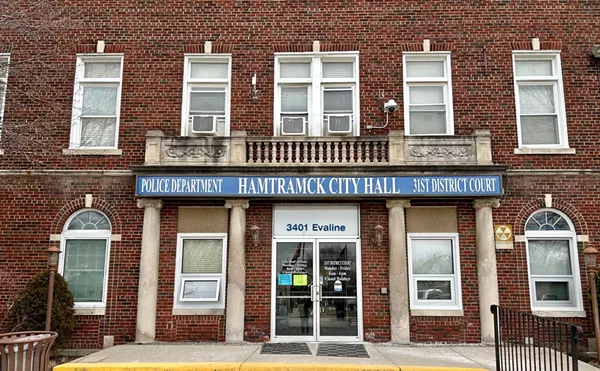Opinion: Sixth Circuit slams police ‘money-making venture’ in Detroit
Wayne County seizes hundreds of vehicles each year on the flimsiest of excuses. Henry Ford might appreciate the factory-like efficiency.

Audio By Carbonatix
[
{
"name": "GPT - Leaderboard - Inline - Content",
"component": "35519556",
"insertPoint": "5th",
"startingPoint": "3",
"requiredCountToDisplay": "3",
"maxInsertions": 100,
"adList": [
{
"adPreset": "LeaderboardInline"
}
]
}
]

Police patrol their communities to keep them safe. But law enforcement agencies in Detroit enlist officers for a different purpose: making money for Wayne County.
Fundraising was the objective in November 2018 during a traffic stop in a heavy-enforcement area. The police pulled over a nearly new Ford Fusion and seized it without issuing a citation or making an arrest. Using the car as ransom, Wayne County prosecutors then demanded $1,355 for its release.
The problem is the car did not belong to the driver. He had borrowed it from his then-girlfriend, Melisa Ingram, telling her that he needed it to find employment. Prosecutors say he used the car instead to search for paid sex — without Ingram’s knowledge or consent.
Officers identified Ingram as an innocent third party when they saw the vehicle registration. But the county did not directly inform her of the seizure until months later. Rather than calling her and giving her a chance to challenge the seizure, the county opted to punish her for someone else’s actions.
The decision left Ingram betrayed twice: First by her then-boyfriend, and then by the government. She is not alone. Wayne County seizes hundreds of vehicles each year on the flimsiest of excuses, and then flips the vehicles for profit in a system designed to maximize revenue.
Henry Ford might appreciate the factory-like efficiency. But the 6th U.S. Circuit Court of Appeals was not impressed.
In a unanimous decision on Aug. 31, 2023, a three-judge panel blasted the county’s treatment of Ingram and two other vehicle owners, who fought back in a joint lawsuit against Wayne County. Our public interest law firm, the Institute for Justice, represents them.
The ruling addresses just one component of the case: the county’s weaponization of delay to gain leverage over vehicle owners, who grow desperate without their cars — often their only means of transportation for work, school, childcare, and medical appointments.
Vehicle owners can talk to a judge, they are told, but they must wait upwards of eight months while impound fees accumulate. They also must attend at least four pretrial conferences with prosecutors. And because vehicle owners lack access to their cars, they must figure out some other way to get these meetings. No excuses. Missing just one appointment results in automatic forfeiture of the vehicle and title transfer to the county.
This is part of the pressure campaign to force out-of-court settlements. The Sixth Circuit calls it “the gauntlet of pretrial conferences.”
Ingram could not afford a deal, but she also needed her car. She was trapped, so she scrounged up the necessary funds and paid. Bankruptcy followed as a result.
Moving forward, the Sixth Circuit will require interim hearings within two weeks of any seizure. Other remedies could come as Ingram’s lawsuit proceeds at the district court level in Detroit. Her goal is to dismantle the entire program, which Sixth Circuit Judge Amul Thapar describes in a concurring opinion as something akin to an extortion racket.
“Wayne County claims that it seizes cars to fight crime (and holds onto them for months for the same reason),” Thapar writes. “But the County is happy to return those very cars as soon as it gets paid. That practice proves the County’s scheme is simply a money-making venture — one most often used to extort money from those who can least afford it.”
Those are sharp words from a judge, but Thapar was not finished. He held that the county’s focus on revenue distorts police priorities, creating perverse incentives to enforce the law as aggressively as possible — even when innocent people like Ingram suffer.
“Wayne County seized Ingram’s car without allowing her to challenge the seizure. And it’s easy to see why,” Thapar writes. “The County can keep the car for months before it owes anyone an explanation, all the while charging a storage fee.”
This is not only unfair, but unconstitutional. Vehicle owners have a right to due process, and Wayne County’s current process offers no process at all.
“Does this sound like a legitimate way of cleaning up Wayne County? Or does it sound like a money-making scheme that preys on those least able to fight it?” Thapar writes. “To ask the question is to answer it.”
Wesley Hottot is a senior attorney and co-director of the National Initiative to End Civil Forfeiture at the Institute for Justice. Daryl James is an Institute for Justice writer.
Subscribe to Metro Times newsletters.
Follow us: Google News | NewsBreak | Reddit | Instagram | Facebook | Twitter






